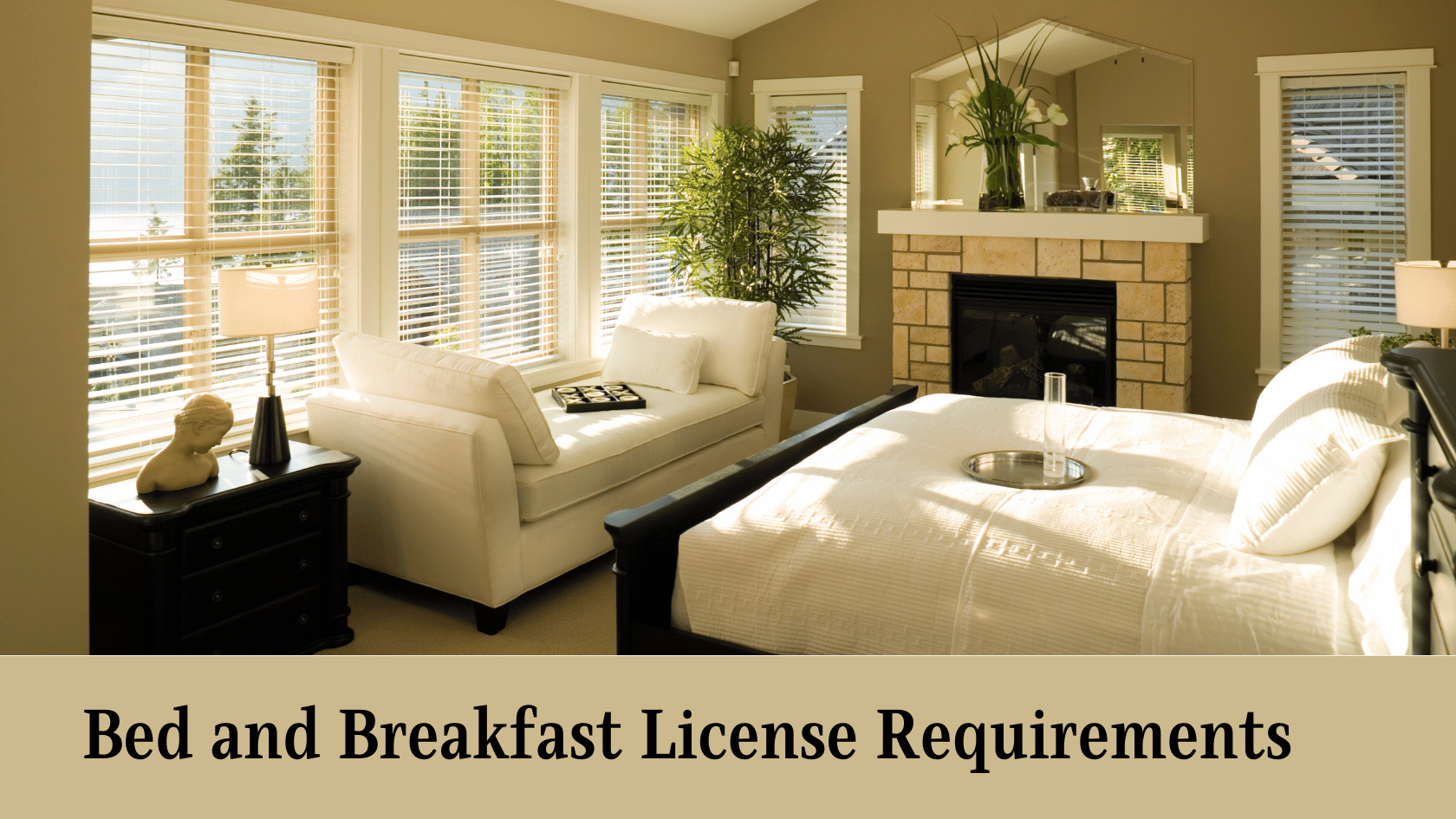Understanding Bed and Breakfast License Requirements

Running a bed and breakfast is great business, but it is also important to understand the regulations and licenses requirements. This comprehensive guide will walk you through the essential aspects of bed and breakfast regulations, focusing on food safety, health standards, and business licensing.
Whether you’re a current owner or aspiring to start your own bed and breakfast, this article provides valuable insights to help you succeed.
What Food Regulations Apply to Bed and Breakfasts?
Food regulations for bed and breakfasts are essential to ensure the safety and satisfaction of guests. These regulations typically vary by state but generally encompass guidelines on food preparation, storage, and serving practices.
Owners must maintain a clean and sanitary kitchen, often equipped with a three-compartment sink for washing, rinsing, and sanitizing dishes. Proper refrigeration and storage solutions are crucial to prevent food contamination. Furthermore, staff training in food hygiene and safety is mandatory to uphold health standards.
Many states classify bed and breakfasts as food establishments, subjecting them to similar regulations as restaurants. This includes regular inspections by health departments to ensure compliance with food safety standards. Adhering to these regulations is essential to avoid fines or the closure of the business.
What Are the Basic Requirements for Bed and Breakfast?
To run a successful bed and breakfast, certain basic requirements must be met, ensuring compliance and guest satisfaction. These requirements include providing comfortable lodging, quality food services, and maintaining a safe and clean environment.
You can read our Ultimate Guide To Starting A Farm-Based Bed And Breakfast Business and understand basic steps to start your own B&B on your farm.
A suitable facility is paramount, meaning your property should have adequate rooms with proper amenities such as clean bedding, functional bathrooms, and essential services like heating and cooling. Compliance with building codes and fire safety regulations, including smoke detectors, fire extinguishers, and clear evacuation routes, is also essential.
Offering food services that meet health and safety standards is another critical aspect. This involves maintaining a clean kitchen, proper food storage, and trained staff to prepare and serve meals safely. Breakfast is a hallmark of bed and breakfast establishments, so ensuring the quality and safety of your food offerings is vital.
Lastly, maintaining proper records and documentation is necessary for compliance with various regulations. This includes keeping records of guest stays, financial transactions, and any health and safety inspections, demonstrating compliance and ensuring smooth operations.
How to Apply for a License for your Bed and Breakfast?
Securing a license for your bed and breakfast is a critical step in establishing a legal and operational business. The process can differ depending on your location, but generally, it involves several key steps:
- Business License Application: You need to apply for a business license with your city or state, which often requires submitting detailed plans of your bed and breakfast, including the number of rooms, layout, and food service areas.
- Health Department Inspection: An inspection by the local health department is usually required to ensure that your facility meets all health and safety standards. This inspection covers food preparation areas, guest rooms, and common areas.
- Zoning Compliance: Ensure that your property is located in an area where running a bed and breakfast is permitted. This may involve obtaining a special use permit or variance.
- Additional Permits: Depending on your state, additional permits related to food service, alcohol service, or other amenities offered to guests may be necessary.
Complying with these steps ensures that your bed and breakfast meets all local and state regulations, providing a safe and enjoyable experience for your guests.
List of Laws and Regulations of Bed and Breakfast in Different states
Here is a list of different laws and regulations of Bed and Breakfast in different states of America. You can visit these links and understand more about the regulations before you jump into opening a B&B on your farm.
What Certifications Are required for Bed and Breakfast Owners?
Certifications are crucial for establishing credibility and ensuring compliance with health and safety standards in bed and breakfast operations. Depending on your location, certain certifications may be required to operate legally.
Food Handler’s Certification: Often mandatory for anyone involved in food preparation or serving, this certification ensures that staff have received proper training in food safety practices, helping to prevent foodborne illnesses.
Food Service Manager Certification: Some states require bed and breakfast owners to obtain this certification, covering more comprehensive aspects of food safety and kitchen management.
Hospitality Management Certifications: These certifications cover topics like guest services, housekeeping standards, and overall facility management. They help in complying with regulations and enhance the quality of service provided to guests.
Staying updated with current regulations and best practices is essential. Many states offer online courses and resources to help bed and breakfast owners stay informed about recent changes in laws and regulations, providing valuable knowledge and ensuring ongoing compliance.
How Do State and Local Health Regulations Affect Bed and Breakfasts?
State and local health regulations are critical for the safety and well-being of guests at bed and breakfast establishments. These regulations vary significantly from state to state, so familiarizing yourself with the specific requirements in your location is essential.
Food Safety: State health regulations often focus on food safety, cleanliness, and general sanitation practices. Many states require bed and breakfast establishments to undergo regular health inspections to ensure that food preparation areas are clean and that food is stored and handled properly.
Cleanliness and Maintenance: Health regulations also cover the overall cleanliness and maintenance of guest rooms and common areas, including ensuring that bedding is clean, bathrooms are sanitized, and common areas are free from hazards.
Specific Health Codes: Be aware of any specific state or local health codes that apply to bed and breakfast establishments, including requirements for water quality, waste disposal, and pest control. Staying informed about these regulations and maintaining high hygiene standards helps avoid penalties and builds a positive reputation for your bed and breakfast.
What Role Does Food Service Play in Bed and Breakfast Facilities?
Food service is a defining feature of bed and breakfast establishments, essential for guest satisfaction and regulatory compliance. Providing high-quality, safe, and appealing food can set your bed and breakfast apart and ensure a memorable experience for guests.
Adhering to Health and Safety Standards: Maintaining a clean kitchen, proper food storage, and safe food handling practices are crucial. Staff should be trained in food safety, including knowledge of cross-contamination prevention, proper cooking temperatures, and hygiene practices.
Diverse and Appealing Menu: Offering a diverse and appealing menu enhances the guest experience. Many bed and breakfasts take pride in serving homemade, locally sourced, or organic foods. Breakfast offerings can range from simple continental breakfasts to elaborate gourmet meals, depending on the target market and guest preferences.
Presentation and Service: Serving food in a pleasant setting, whether it’s a cozy dining room or a garden patio, adds to the overall charm of the bed and breakfast experience. Attention to detail in food service can leave a lasting impression on guests and encourage repeat visits.
What Are the Inspection and Permit Requirements for Bed and Breakfasts?
Inspections and permits are fundamental aspects of operating a bed and breakfast, ensuring that the establishment meets all regulatory standards and is safe for guests. Understanding these requirements helps avoid legal issues and ensures smooth operations.
Health Inspections: Focus on the cleanliness of food preparation areas, proper storage, and handling of food. Regular health inspections by local health departments ensure compliance with food safety standards.
Building Inspections: Ensure that the facility meets fire safety codes, structural integrity, and accessibility standards. This includes having smoke detectors, fire extinguishers, and clear evacuation routes.
Permits: Necessary permits for legally operating a bed and breakfast include a business license, health permit, and, if serving alcohol, a liquor license. Obtaining these permits usually involves submitting detailed plans of the establishment, undergoing inspections, and paying applicable fees.
Regular inspections are often required to maintain these permits. Staying informed about the frequency and scope of required inspections in your area ensures the safety of guests and the legal operation of your business.
How to Maintain Hygiene Standards in Your Bed and Breakfast?
Maintaining high hygiene standards is critical for the success and reputation of a bed and breakfast. Ensuring that your establishment is clean and sanitary not only complies with regulations but also enhances guest satisfaction.
Thorough Cleaning Routine: Cover all areas of the bed and breakfast, including guest rooms, bathrooms, kitchens, and common areas. This routine should include daily cleaning tasks as well as deeper cleaning on a regular basis. Using appropriate cleaning products and techniques is essential to effectively eliminate germs and prevent the spread of illness.
Kitchen Hygiene Practices: Regular cleaning and sanitizing of surfaces, proper food storage, and safe food handling practices are essential. Staff should be trained in hygiene standards to maintain a high level of cleanliness in food preparation areas.
Guest Room Cleanliness: Ensuring that bedding is clean, bathrooms are sanitized, and common areas are free from hazards. Regular inspections and cleaning schedules help maintain high hygiene standards throughout the facility.
Understanding Tax Obligations for Bed and Breakfast Businesses
Operating a bed and breakfast involves understanding and complying with various tax obligations. These obligations can vary depending on your location and the specific services you offer.
Income Tax: As a business owner, you are required to report and pay income tax on the profits generated from your bed and breakfast. This includes keeping accurate records of all income and expenses to ensure proper reporting.
Sales Tax: If you provide meals or other taxable services to guests, you may be required to collect and remit sales tax to the state. Understanding the specific sales tax regulations in your state is crucial for compliance.
Occupancy Tax: Many states and localities impose an occupancy tax on short-term lodging, including bed and breakfast establishments. This tax is typically collected from guests and remitted to the appropriate tax authority.
Staying informed about your tax obligations and maintaining accurate financial records helps ensure compliance and avoids potential penalties. Consulting with a tax professional can provide valuable guidance and support in managing your tax responsibilities.






